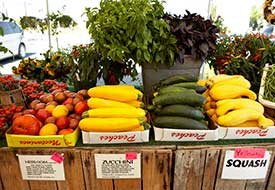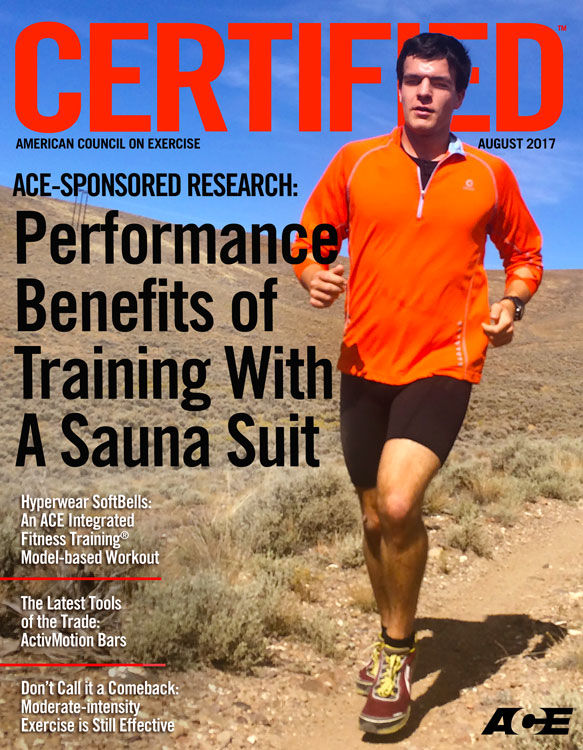
When it comes to nutrition, there is an endless supply of myths, misconceptions and misleading information. This includes everything from fad diets and so-called superfoods to conflicting research findings and government guidelines influenced by both political and corporate interests. What is clear, however, is that people are unclear about what and how to eat.
“If you were to simply read the headlines of nutrition-related news on any given day, you would see things like coconuts being hailed as a superfood one day and then the next day [being told] they are horrible for your health,” says Lauray MacElhern, M.B.A., managing director of the Center for Integrative Medicine at University of California, San Diego (UCSD). “This type of conflicting and constantly changing information leaves people feeling like perhaps nutrition doesn’t really matter all that much when it comes to health.”
With continually rising rates of chronic diseases, such as cardiovascular disease, type 2 diabetes and obesity, a growing body of evidence highlights the positive role that a healthful diet plays in both the management and prevention of these types of lifestyle-related illnesses, and its effects on other diseases, including cancer. Yet despite this readily available information, there exists a major gap amongst health and fitness professionals in terms of the knowledge and skills they possess.
“Health and wellness professionals are realizing more and more the dramatic impact food has on health and well-being, but often, surprisingly, nutrition and/or culinary skills are missing pieces of the curriculum and training they receive and that, in turn, they can translate and provide to their clients and patients,” notes MacElhern. “Culinary literacy is such a new and interesting area, one that hasn’t even been fully defined yet in the literature, but more and more researchers are looking to measure culinary skills and how they are linked to good nutrition and ultimately, hopefully glowing health.”
From community centers and corporations to hospitals and medical school programs, there is a movement underway to deepen the nutritional knowledge of both health professionals and the public by developing and applying culinary skills and food-preparation strategies to cultivate a strong relationship with food as a primary source of optimal health and well-being.
“The interest comes from the growing realization that, as Hippocrates so wisely stated thousands of years ago, food is medicine, and the only way to truly harness the power of food is through home cooking,” shares MacElhern. “Culinary literacy, or having at least basic cooking skills, becomes a critical component to leveraging the transformative power of food.”
In light of the importance of cooking, health and fitness professionals ranging from physicians and nurses to personal trainers and health coaches are getting to work in the kitchen so that they can ultimately have a greater impact on the lives of the people they serve.
Although 90% of Americans say diet and nutrition are important, nearly half of them don’t know or understand how to achieve a balanced diet, according to the Academy of Nutrition and Dietetics.
Opportunities to Expand Your Knowledge
For professionals who feel compelled to dive deeper into helping clients translate nutrition science into delicious and nourishing dishes and enhanced cooking skills, there is an assortment of practically oriented educational offerings available in the area of culinary literacy. One particular continuing education event that has been leading the charge for the past 10 years in terms of teaching health professionals about nutrition and self-care skills is Healthy Kitchens, Healthy Lives, created by Dr. David Eisenberg and the Harvard T.H. Chan School of Public Health in collaboration with Mark Erickson and The Culinary Institute of America. The intention of the event, which combines healthcare, nutrition science and culinary arts, is to educate professionals across the healthcare continuum through lectures, demonstrations and hands-on, interactive cooking demonstrations to increase their own food and cooking knowledge and skills. The event also aims to deepen professionals' understanding of other supporting areas of self-care, including mindfulness, behavior change, and movement and exercise. It is through this interdisciplinary approach that health and wellness providers will be able to serve as role models and, in turn, be better positioned to assist people in optimizing their well-being and reducing the risk for disease.
This assertion is not purely theoretical—it has been the focus of research and reinforced through the findings of a recently published pilot study of a teaching kitchen and self-care curriculum that Eisenberg and others have developed through the Teaching Kitchen Collaborative, an invitational network of organizations launched in 2016. This group of nearly three dozen organizations across 16 different states in the U.S. as well as two other countries, are each using teaching kitchen facilities to enhance personal and public health in an assortment of community, corporate, academic and clinical settings.
One of those teaching kitchens is located at UCSD, where MacElhern, in collaboration with preventive medicine physician and nutritional epidemiologist Dr. Gordon Saxe, M.D., Ph.D., M.P.H., has developed not one but two different food-oriented programs. The first is the Natural Healing and Cooking Program, which is an interactive eight-week class intended for people who want to use the healing power of food to rejuvenate themselves from the inside out. The course, which attracts health professionals, medical students, residents, caregivers and patients alike, draws from nutrition science, epidemiology, and time-tested principles and culinary practices from around the world to provide a proven, practical and delicious way to optimize health through food.
For professionals who’d like to further their knowledge, the university also offers a Certificate in Integrative Nutrition. This 140-hour online, career-focused training program was designed for those who want to learn more about the value of food, nutrition and culinary practices as a means of promoting health and wellness and preventing and combating disease. It also examines how to effectively coach patients, clients and members of the community in this capacity. With courses ranging from “Food as Medicine” to the “Business of Integrative Nutrition,” the program provides holistic dietary principles rooted in ancient wisdom and supported by modern science, along with career guidance and professional insight for navigating the growing field of integrative nutrition from a business perspective. The online program also provides the necessary educational requirement, which is part of the eligibility criteria to sit for the Certified Nutrition Specialist exam, an NCCA-accredited certification that, to date, is the only non-dietetics credential and examination specifically named in a number of state nutrition licensure laws.
Considerations for Putting Nutritional Knowledge Into Practice
Health and fitness professionals who are not licensed registered dietitians are justifiably hesitant to go beyond simply providing clients and patients with the established USDA nutritional guidelines for fear of extending beyond their scope of practice. However, the reality is the public is seeking and in need of more practical nutrition and culinary information from health, fitness and wellness professionals alike. In addition, most nutrition professionals are in support of this important foundational information being shared more readily by others in the field who have completed appropriate nutrition and culinary continuing education and training.
“I’ve heard from many dietitians and nutritionally oriented physicians that they would love to partner with food- and culinary-focused health coaches, for example, who could help carry out offerings such as group-based cooking classes, assisting clients with kitchen makeovers, and providing ongoing one-on-one support for individuals from a behavioral perspective,” says MacElhern.
Two such supporters are Tiffani Bachus, R.D.N., an ACE Behavior Change Specialist and co-author of No Excuses! 50 Healthy Ways to Rock Breakfast, and her business partner Erin MacDonald, R.D.N., who together founded U Rock Girl. “We encourage health and wellness professionals to broaden their culinary literacy and to be well-versed in food and cooking technique,” says Bachus, who is also a certified personal trainer and group fitness instructor. “Being able to help clients understand the process of planning, organizing, grocery shopping, creating healthy recipes and identifying helpful, credible resources goes a long way in supporting their efforts to live a healthy lifestyle, while optimizing their success in reaching their nutrition and wellness goals.”
Over the course of her career as a registered dietitian nutritionist working with hundreds of clients and patients, Bachus has found that the biggest challenge often centers around shifting an individual’s focus from a fad-diet approach to eating to a balanced nutrition approach, which includes consuming real, plant-based foods.
“Applying concepts of healthy cooking and portion control is a struggle for many of my clients, as is having diversity in their choices of ingredients,” shares Bachus. “I spend a great deal of time educating them on including more seasonal and local ingredients when preparing meals, with an emphasis on nutrient-rich foods and a balance of macronutrients, including lean protein sources, plant-based carbohydrates (more vegetables and less starches), and healthy fat from foods such as nuts and seeds.” (Check out the spotlight, Five Pillars of a Healthy Diet.)
Given the common challenges witnessed across the field of nutrition, fitness and wellness, Bachus and MacDonald created the Clean Eating Academy, A Whole Life Guide to Lasting Weight Loss.
“We know from our experience that handing out meal plans and workouts alone would not help our clients reach their long-term health goals, as it takes a comprehensive approach to accomplish lasting weight loss,” say Bachus. They developed this nine-week online program with the intention of educating and guiding individuals on nutritional concepts, meal preparation, cooking techniques, grocery shopping, physical activity, mindful eating, sleep hygiene, stress management and gut health, offering a multidimensional approach that is similar to the teaching kitchen self-care curriculum, but with a focus on individuals who struggle with maintaining a healthy weight and body composition.
Just as the tell-show-do approach to exercise instruction provides personal training clients and group fitness participants with a multidimensional learning experience, a similar approach can be used to help clients increase their food and culinary literacy. Bachus offers the following practical suggestions to help you get started putting your knowledge and skills into practice.

5 Pillars of a Healthy Diet
To assist individuals with adopting and adhering to a more healthful diet, MacElhern and Saxe have identified five basic practical and proven principles that serve as the framework for the UCSD Natural Healing and Cooking Program.
“In our program we refer to the Five Pillars of a Healthy Diet, which are founded on ancient healing systems, such as that of Chinese medicine and Ayurveda, but continue to be reinforced again and again by modern science and the latest research,” notes MacElhern.
Pillar #1: Whole food. Opt for foods that are as close as possible to their natural state and simply prepared using seasonally appropriate cooking methods, as opposed to those that are highly refined and heavily processed. Additionally, consume all edible parts of foods whenever possible (e.g., edible skins on various fruits and vegetables, fully intact whole grains, the bottoms and tops of root vegetables).
Pillar #2: Plant-based. This does not necessarily mean following a strict vegan diet, but rather emphasizing the importance of consuming primarily a plant-forward diet. While there are compelling ethical and environmental reasons to adopt a fully plant-based diet, it is important to bear in mind that a vegan diet does not always equate to a healthy diet. Therefore, in addition to consuming primarily plant-based foods, it’s important to also choose whole-food options as opposed to those that are chemically or industrially processed (e.g., vegan foods engineered to taste like animal-based foods like meat or dairy).
Pillar #3: Diverse and balanced. Not only should diets be balanced in terms of required macronutrients and micronutrients, but foods should also be diverse and balanced in terms of color, textures, flavors and tastes. This includes incorporating a range of plant-based food groups (e.g., whole grains, vegetables); employing a variety of cooking and preparation methods, taking into account what is appropriate to the season and one’s personal condition (for example, utilizing deeper cooking methods such as baking during the cold months of winter, and steaming or enjoying foods raw foods during the warm months of summer); and ensuring foods are pleasing to all of the senses, given that the process of digestion begins upon first seeing, smelling or thinking about food.
Pillar #4: Locally grown and seasonal. Foods tend to be freshest, ripest, less expensive, most nutrient-dense and more environmentally sustainable when sourced locally with what is grown and harvested during the current season. While fruits and vegetables that are flash-frozen after harvest may offer a convenient and sometimes budget-friendly option with similar nutritional value, it is better to choose fresh, locally sourced produce whenever possible.
Pillar #5: Organic and biodynamic. As much as possible, opt for food grown in rich soils that are free from contamination. This helps to produce foods that are free of toxins, rich in nutrients and delicious in taste, while also supporting the health of the larger ecosystem. When making decisions on organic produce, be sure to reference the Environmental Working Group’s “Dirty Dozen” and “Clean 15” lists. You might also consider contacting local farmers for more details on their farming practices, as not all farms may be able to afford organic labeling, yet may be employing best practices to produce organic, biodynamic foods.
1. Educate clients on nutrient-rich foods to include in their diets
Distributing and disseminating information or programs that have been developed by a registered dietitian or medical doctor is within your scope of practice as a health and fitness professional. Therefore, you can offer an assortment of educational resources for clients to learn basic food preparation and culinary skills. You also may choose to develop your own handouts or other supporting educational materials (e.g., brief video clips, podcast episodes) on topics such as the principles of healthy nutrition and food preparation, insight into foods and essential nutrients to be included in a balanced daily diet, and the actions of nutrients in the body, all of which are also within your scope of practice. These resources can be offered free of charge, for a one-time fee, or included as part of a paid course or membership site. Additionally, when working one-on-one with individuals, consider employing a coach-approach to disseminating specific information upon a client’s request, such as the elicit-provide-elicit model used in motivational interviewing.
2. Facilitate a grocery store and/or farmers market tour.
Helping clients learn how to most optimally navigate the grocery store or farmers market to make more healthful food choices is a service you may wish to offer clients as a stand-alone option, or as part of a multisession coaching or training package. Guiding individuals section-by-section through the grocery store, with or without the use of educational handouts or general shopping lists, can be a valuable experience for clients. You can teach them how to read food labels, compare products for quality of ingredients, and apply general nutritional information in making item selections and devising a plan for future shopping trips.
3. Innovate how clients prepare food.
Leading an interactive cooking demonstration, showing proper portion sizes and food-preparation skills, exploring approaches for swapping ingredients and recipes, and applying batch-cooking techniques are just some of the ways you can increase your clients’ knowledge, confidence and skills in the kitchen. Complimentary and/or paid demos, seminars, group classes and/or individual sessions that center on how to create healthy meals that are cost-effective, easy to prepare and delicious can be offered independently or in collaboration with local organizations or fellow professionals. You may even consider creating these offerings in partnership with your current place of employment, such as a gym or community center, as an additional source of revenue or to attract new members.
Keep in mind that the guidance you provide clients need not be overly complicated to be effective. In fact, as a health and fitness professional, you have the opportunity and the obligation to help demystify the many misconceptions regarding nutrition by ensuring that the information you deliver and the services you provide are rooted in the most current research, while also making it understandable, easy to apply, and exciting and empowering for individuals to integrate into their daily lives.
Interested in deepening your nutritional knowledge and culinary literacy? Become an ACE Fitness Nutrition Specialist and learn to translate scientifically supported, practical information into actionable lifestyle change for your clients.
It is the position of the American Council on Exercise (ACE) that fitness professionals not only can but should share general nonmedical nutrition information with their clients.
Fitness professionals may share this information through a variety of venues, including cooking demonstrations, recipe exchanges, development of handouts and informational packets, individual or group classes and seminars, or one-on-one encounters.
Fitness professionals who do not feel comfortable sharing this information are strongly encouraged to undergo continuing education to further develop nutrition competency and skills and to develop relationships with registered dietitians or other qualified health professionals who can provide this information.





 by
by 



